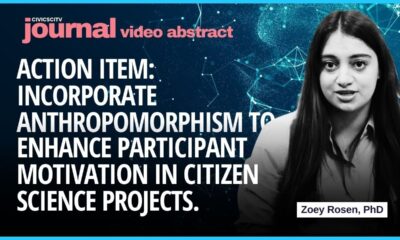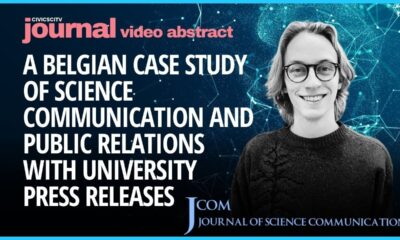Civic Science Observer
Open Proposal: Career Exploration for Graduate Students
by Fanuel Muindi | Co-Director, STEM Education Advocacy Group
[dropcap]A[/dropcap]round the world, countries continue to produce more and more PhDs each year [1]. In the U.S., many reform initiatives have been proposed to improve research training programs in order to better equip graduate students and postdoctoral fellows to be successful across a range of career pathways [2]. Approaches include the expansion of funding programs to broaden experiences in scientific training for graduate students, offering more extensive career planning tools and workshops, and recommending increased faculty engagement and cooperation in helping students and postdocs identify career paths that fit their interests.
Many of the approaches offer a top down approach to help students understand their career options. These come in the form of telling students what they should be doing and how they should be doing it as they think about careers both within and outside academia. Although such approaches are useful, we think that bottom-up approaches are just as important. These come in the form of purely student driven initiatives that seek to understand the career landscape. These bottom-up approaches give student the ultimate control and responsibility for their own path both within and outside academia. Over the long run, we think that such approaches are more likely to empower students to take a more active role since a substantial degree of responsibility lies with the trainees. Trainees around the world must be inspired to be active participants in their own future and use all available resources to explore the rather large repository of knowledge and resources about careers for scientists across a range of sectors [3]. Here, we suggest an open proposal that can be used by universities, organizations, student groups and others with an interest on career development of trainees in the biosciences.
INSpire
Our proposal is called INSPire: Inform, Support, Promote, and inquIRE. The core of the project is designed to provide the support and infrastructure for students to be in the driving seat of their own career paths by working together in groups. The proposed projects are intended to impact these groups of students by inspiring and empowering them to take an even more active role in learning about and preparing themselves for their chosen career interests wherever in the world they are doing their PhD training.
This is important since graduate trainees come with a diversity of interests both scientifically and what they want to do after their completing their training periods. Of course, these interests can change dramatically during their training of five or more years. Around the world, there are probably groups of students – which some have described as to have that real passion for science and know that a tenure track position is the main goal [4]. There are of course students that are undecided about the traditional academic path and are keeping their options open both within and outside academia. And finally, there are students that are confident they want to pursue a career outside academia.
Our proposed project aims to impact students’ career awareness and exposure in the following ways:
(1) Provide peer mentorship space and support for developing self-organized student career groups to be able to:
- organize regular meetings to share strategies and new updates in the career fields
- invite speakers specific to the group’s interests
- attend local conferences (e.g., Future of Research Conference in Boston)
- host career mini retreats
- share ideas and self-gathered data with each other and students from outside the department
- collaborate to host events with other student groups on campus
(2) Build a website/mobile app with a storage of curated career resources to help them navigate the large repository of knowledge. This resource should enable students to quickly:
- find useful must-read material on career paths and strategies
- find videos of career panels/speakers
- gather basic statistics (locally and internationally) of where PhDs are mostly employed
- find and search vignettes/blogs of PhD students and their stories (inside and outside department)
- calendar of career related events in their local area
SPECIFIC AIMS
AIM I – To promote the development capacity of self-organized student career groups
Challenge: To characterize and support the development of student trainee career groups with the capacity to run events, gather data, and share new ideas/strategies
Rationale: University student career groups are a great way to provide the necessary environment that allow students the space to talk openly and explore their career interests with each other. The formation of these groups should be encouraged at the level of individual departments and also at the university level.
Approach: The first step is to identify the existing student career groups and/or encourage the formation of such groups within specific departments. These should include but not limited to the following: Academic research and teaching, industry (entrepreneurship, biotech, data science), regulatory affairs, science communication, consulting, higher education management, and science policy,
Depending on the data acquired, students should be encouraged to join existing groups, or form new groups around a career interest. In order for groups to be recognized, each group should be required to present the following:
- general mission statement
- specific goals for the upcoming year
- scheduled meeting times
- leadership organization
- department alumni mentor (ideally) in their career area of interest
Once the career interest groups have been formed, students should work closely with their university and or departmental career offices on writing funding proposals (if funding is required) to support some of their events.
Encouraged events should include but not be limited to:
- organize regular meetings
- inviting speakers specific to the group’s interests
- attending outside local meetings or conferences
- hosting journal clubs to discuss relevant career papers
- hosting career mini retreats for the group
- collaborating to host events with other student groups from nearby universities
As indicated above, groups should be required to find a department alumnus to be a mentor. The mentor should serve as someone they can communicate with to get ideas on discussion topics. Additional mentorship should be given from their individual local university career office,
Groups should be strongly encouraged and mentored to trying out new ideas (e.g., myIDP integration) with respect to career exploration. Given the bottom-up organization, students should have full control on what they would like to try. We think this is an important aspect of the project as it aims to give students the necessary space to take full control of their career trajectories.
Once there are enough groups that span the different domains of careers for PhDs, a yearly conference of student groups to showcase their activities and outcomes should be encouraged or even mandated. We believe this is the important innovative aspect of this aim. At this event, groups can present posters and/or oral presentations to share data and also best practices regarding their specific group. The event should encourage the open exchange of ideas so that all groups can learn from each other and even present opportunities to collaborate. As further encouragement, it may even be possible to award the best student group with certificates and/or funding for the upcoming year. This healthy level of competition should further incentivize the student groups.
It is anticipated that some groups will be more successful than others. In fact, we think this is important as it will expose the key areas that made one group succeed over another. As such, such knowledge can be shared with other departments and universities through publications in places like Nature, Science and also various science blogs.
EVALUATION
It will be important to assess impact in-order to know what is or is not working. We suggest using a mixed-methods evaluation methodology should to include data collection (see below) in addition to semi-structured interviews. All groups should be required to keep track of the following indicators of success for each semester:
- event attendance records
- IDP completion rates (this should be required for all groups)
- types of events held
- member feedback on the group via surveys
AIM II – Develop a department or university specific PhD career exploration mobile app/website
Challenge: To build a user friendly online mobile app to aid students in understanding the wide range of information regarding particular career paths, useful contacts, and helpful hints for those looking into what they could do with their PhDs
Rationale: A major issue is that there is so much information out there (a lot of it noise) regarding what to do after the PhD. The process can be overwhelming for both faculty and students. There is a clear need for a mobile portal which students can quickly access to get up to date information.
Approach: (1) We propose to first understand what it is that students need. We recommend to first conduct a small study to fully understand student need in career guidance. What type of information do they mostly seek? Which information is most useful? What would they like to see in a mobile app or a website? Answers to these questions should provide an important insight into the information students are really looking for. Under the guidance of the graduate program office and faculty mentor, a committee of students should oversee the design, delivery and analysis of the survey.
If applicable, a developer should be hired to work closely with the department and the student committee to integrate the following list of must have features:
- career events calendar
- must read articles
- student career group club updates (from aim 1)
- careers in science news feed
- career event videos
- Outline the app/website design and user interface
- Decide on app/website support and maintenance
- Ensure content is available on each of the decided must have features
DELIVERY & EVALUATION
Once complete, students should know about the resource as early as possible in the training. Students should be encouraged to explore the app/website and explore its features. After launch, students should be surveyed every 2-3 months in order to assess the effectiveness of the app/website. The app/website design should include analytics to allow close monitoring of student behavior on the app to see what content students spend the most time on. Students should also be surveyed periodically to gather additional feedback on the app and/or website.
PROJECT EXPANSION
We think this online portal, if successful, can be used or mimicked by other departments. It is conceivable that some universities and departments are likely to build state of the art apps and/or websites. With the explosion of information available to students on careers, the challenge now is to find the most effective method for students to engage with the large repository of knowledge. Once launched, we think that the app should galvanize the biosciences community to expand on our design and develop even better PhD online career exploration tools. We strongly suggest to publicly share data on the app/website development so that others can integrate new features into their own apps/websites.
REFERENCES
- Cyranoski, D., Gilbert, N., Ledford, H., Nayar, A. & Yahia, M. The phd factory. Nature 276–279 (2011).https://www.nature.com/news/2011/110420/full/472276a.html
- Alberts, B., Kirschner, M.W., Tilghman, S. & Varmus, H. Proc. Natl. Acad. Sci. USA 111, 5773–5777 (2014). http://www.pnas.org/content/111/16/5773
- Muindi F, Keller JB. Emerging network of resources for exploring paths beyond academia. Nature biotechnology; 33: 775-8. (2015). https://www.nature.com/nbt/journal/v33/n7/full/nbt.3282.html
- Polka, J. K. & Krukenberg, K. A. Making science a desirable career. Science (80-. ). 346, 1422–1422 (2014). DOI: 10.1126/science.346.6215.1422 | http://science.sciencemag.org/content/346/6215/1422/tab-article-info
The CS Media Lab is a Boston-anchored civic science news collective with local, national and global coverage on TV, digital print, and radio through CivicSciTV, CivicSciTimes, and CivicSciRadio. Programs include Questions of the Day, Changemakers, QuickTake, Consider This Next, Stories in Science, Sai Resident Collective and more.

-
 Audio Studio1 month ago
Audio Studio1 month ago“Reading it opened up a whole new world.” Kim Steele on building her company ‘Documentaries Don’t Work’
-
Civic Science Observer1 week ago
‘Science policy’ Google searches spiked in 2025. What does that mean?
-
Civic Science Observer1 month ago
Our developing civic science photojournalism experiment: Photos from 2025
-
Civic Science Observer1 month ago
Together again: Day 1 of the 2025 ASTC conference in black and white
Contact
Menu
Designed with WordPress
























